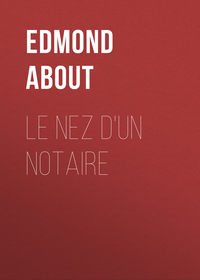 полная версия
полная версияThe Man With The Broken Ear
Willing or unwilling, they had to concede all he required and accept his million. This act of generosity made a great commotion in the town, and the name of Fougas, already celebrated in so many ways, acquired a new prestige. The signature of the bride was attested by the Marshal the Duke of Solferino and the illustrious Karl Nibor, who but a few days before had been elected to the Academy of Sciences. Leon modestly retained the old friends whom he had long since chosen, M. Audret the architect, and M. Bonnivet the notary.
The Mayor was brilliant in his new scarf. The curé addressed to the young couple an affecting allocution on the inexhaustible goodness of Providence, which still occasionally performs a miracle for the benefit of true Christians. Fougas, who had not discharged his religious duties since 1801, soaked two handkerchiefs with tears.
"One must always part from those nearest the heart," said he on going out of church. "But God and I are made to understand each other! After all, what is God but a little more universal Napoleon!"
A Pantagruelic feast, presided over by Mlle. Virginie Sambucco in a dress of puce-colored silk, followed immediately upon the marriage ceremony. Twenty-four persons were present at this family fête, among others the new colonel of the 23d and M. du Marnet, who was almost well of his wound.
Fougas took up his napkin with a certain anxiety. He hoped that the Marshal had brought his brevet as brigadier general. His expressive countenance manifested lively disappointment at the empty plate.
The Duke of Solferino, who had been seated at the place of honor, noticed this physiognomical display, and said aloud:
"Don't be impatient, my old comrade! I know what you miss; it was not my fault that the fête was not complete. The minister of war was out when I dropped in on my way here. I was told however, at the department, that your affair was kept in suspense by a technical question, but that you would receive a letter from the office within twenty-four hours."
"Devil take the documents!" cried Fougas. "They've got them all, from my birth-certificate, down to the copy of my brevet colonel's commission. You'll find out that they want a certificate of vaccination or some such six-penny shinplaster!"
"Oh! Patience, young man! You've time enough to wait. It's not such a case as mine: without the Italian campaign, which gave me a chance to snatch the baton, they would have slit my ear like a condemned horse, under the empty pretext that I was sixty-five years old. You're not yet twenty-five, and you're on the point of becoming a brigadier: the Emperor promised it to you before me. In four or five years from now, you'll have the gold stars, unless some bad luck interferes. After which you'll need nothing but the command of an army and a successful campaign to make you Marshal of France and Senator, which may nothing prevent!"
"Yes," responded Fougas; "I'll reach it. Not only because I am the youngest of all the officers of my grade, and because I have been in the mightiest of wars and followed the lessons of the master of Bellona's fields, but above all because Destiny has marked me with her sign. Why did the bullets spare me in more than twenty battles? Why have I sped over oceans of steel and fire without my skin receiving a scratch? It is because I have a star, as He had. His was the grander, it is true, but it went out at St. Helena, while mine is burning in Heaven still! If Doctor Nibor resuscitated me with a few drops of warm water, it was because my destiny was not yet accomplished. If the will of the French people has re-established the imperial throne, it was to furnish me a series of opportunities for my valor, during the conquest of Europe which we are about to recommence! Vive l'Empereur, and me too! I shall be duke or prince in less than ten years, and … why not? One might try to be at roll-call on the day when crowns are distributed! In that case, I will adopt Clementine's oldest son: we will call him Pierre Victor II., and he shall succeed me on the throne just as Louis XV. succeeded his grandfather Louis XIV.!"
As he was finishing this wonderful speech, a gendarme entered the dining room, asked for Colonel Fougas, and handed him a letter from the Minister of War.
"Gad!" cried the Marshal, "it would be pleasant to have your promotion arrive at the end of such a discourse. For once, we would prostrate ourselves before your star! The Magi kings would be nowhere compared with us."
"Read it yourself," said he to the Marshal, holding out to him the great sheet of paper. "But no! I have always looked Death in the face; I will not turn my eyes away from this paper thunder if it is killing me.
"Colonel:
"In preparing the Imperial decree which elevated you to the rank of brigadier general, I found myself in the presence of an insurmountable obstacle: viz., your certificate of birth. It appears from that document that you were born in 1789, and that you have already passed your seventieth year. Now, the limit of age being fixed at sixty years for colonels, sixty-two for brigadier generals and sixty-five for generals of division, I find myself under the absolute necessity of placing you upon the retired list with the rank of colonel. I know, Monsieur, how little this measure is justified by your apparent age, and I sincerely regret that France should be deprived of the services of a man of your capacity and merit. Moreover, it is certain that an exception in your favor would arouse no dissatisfaction in the army and would meet with nothing but sympathetic approval. But the law is express, and the Emperor himself cannot violate or elude it. The impossibility resulting from it is so absolute that if, in your ardor to serve the country, you were willing to lay aside your epaulettes for the sake of beginning upon a new career, your enlistment could not be received in a single regiment of the army. It is fortunate, Monsieur, that the Emperor's government has been able to furnish you the means of subsistence in obtaining from His Royal Highness the Regent of Prussia the indemnity which was due you; for there is not even an office in the civil administration in which, even by special favor, a man seventy years old could be placed. You will very justly object that the laws and regulations now in force date from a period when experiments on the revivification of men had not yet met with favorable results. But the law is made for the mass of mankind, and cannot take any account of exceptions. Undoubtedly attention would be directed to its amendment if cases of resuscitation were to present themselves in sufficient number.
"Accept, &c."A gloomy silence succeeded the reading. The Mene mene tekel upharsin of the oriental legends could not have more completely produced the effect of thunderbolts. The gendarme was still there, standing in the position of the soldier without arms, awaiting Fougas' receipt. The Colonel called for pen and ink, signed the paper, gave the gendarme drink-money, and said to him with ill-suppressed emotion:
"You are happy, you are! No one prevents you from serving the country. Well," added he, turning toward the Marshal, "what do you say to that?"
"What would you have me say, my poor old boy? It breaks me all up. There's no use in arguing against the law; it's express. The stupid thing on our parts was not to think of it sooner. But who the Devil would have thought of the retired list in the presence of such a fellow as you are?"
The two colonels avowed that such an objection would never have entered their heads; now that it had been suggested, however, they could not see what to rebut it with. Neither of them would have been able to enlist Fougas as a private soldier, despite his ability, his physical strength and his appearance of being twenty-four years old.
"If some one would only kill me!" cried Fougas. "I can't set myself to weighing sugar or planting cabbages. It was in the career of arms that I took my first steps; I must continue in it or die. What can I do? What can I become? Take service in some foreign army? Never! The fate of Moreau is still before my eyes.... Oh Fortune! What have I done to thee that I should be dashed so low, when thou wast preparing to raise me so high?"
Clementine tried to console him with soothing words.
"You shall live near us," said she. "We will find you a pretty little wife, and you can rear your children. In your leisure moments you can write the history of the great deeds you have done. You will want for nothing: youth, health, fortune, family, all that makes up the happiness of men, is yours. Why then should you not be happy?"
Leon and his parents talked with him in the same way. Everything appertaining to the festive occasion was forgotten in the presence of an affliction so real and a dejection so profound.
He roused himself little by little, and even sang, at dessert, a little song which he had prepared for the occasion.
Here's a health to these fortunate loversWho, on this thrice blessed day,Have singed with the torch of chaste Hymen,The wings with which Cupid doth stray.And now, little volatile boy-god,You must keep yourself quiet at home—Enchained there by this happy marriageWhere Genius and Beauty are one.He'll make it, henceforth, his endeavorTo keep Pleasure in Loyalty's power,Forgetting his naughty old habitOf roaming from flower to flower.And Clementine makes the task easy,For roses spring up at her smile:From thence the young rascal can steal themAs well as in Venus's isle.The verses were loudly applauded, but the poor Colonel smiled sadly, talked but little, and did not get fuddled at all. The man with the broken ear could not at all console himself for having a slit ear.12 He took part in the various diversions of the day, but was no longer the brilliant companion who had inspired everything with his impetuous gayety.
The Marshal buttonholed him during the evening and said: "What are you thinking about?"
"I'm thinking of the old messmates who were happy enough to fall at Waterloo with their faces toward the enemy. That old fool of a Dutchman who preserved me for posterity, did me but a sorry service. I tell you, Leblanc, a man ought to live in his own day. Later is too late."
"Oh, pshaw, Fougas, don't talk nonsense! There's nothing desperate in the case. Devil take it! I'll go to see the Emperor to-morrow. The matter shall be looked into. It will all be set straight. Men like you! Why France hasn't got them by the dozen that she should fling them among the soiled linen."
"Thanks! You're a good old boy, and a true one. There were five hundred thousand of us, of the same, same sort, in 1812; there are but two left; say, rather, one and a half."
About ten o'clock in the evening, M. Rollon, M. du Marnet and Fougas accompanied the Marshal to the cars. Fougas embraced his comrade and promised him to be of good cheer. After the train left, the three colonels went back to town on foot. In passing M. Rollon's house, Fougas said to his successor:
"You're not very hospitable to-night; you don't even offer us a pony of that good Andaye brandy!"
"I thought you were not in drinking trim," said M. Rollon. "You didn't take anything in your coffee or afterwards. But come up!"
"My thirst has come back with a vengeance."
"That's a good symptom."
He drank in a melancholy fashion, and scarcely wet his lips in his glass. He stopped a little while before the flag, took hold of the staff, spread out the silk, counted the holes that cannon balls and bullets had made in it, and could not repress his tears. "Positively," said he, "the brandy has taken me in the throat; I'm not a man to-night. Good evening, gentlemen."
"Hold on! We'll go back with you."
"Oh, my hotel is only a step."
"It's all the same. But what's your idea in staying at a hotel when you have two houses in town at your service?"
"On the strength of that, I am going to move to-morrow."
The next morning, about eleven o'clock, the happy Leon was at his toilet when a telegram was brought to him. He opened it without noticing that it was addressed to M. Fougas, and uttered a cry of joy. Here is the laconic message which brought him so much pleasure:
"To Colonel Fougas, Fontainebleau.
"Just left the Emperor. You to be brevet brigadier until something better turns up. If necessary, corps legislatif will amend law.
"Leblanc."Leon dressed himself, ran to the hotel of the blue sundial, and found Fougas dead in his bed.
It is said in Fontainebleau, that M. Nibor made an autopsy, and found that serious disorders had been produced by desiccation. Some people are nevertheless satisfied that Fougas committed suicide. It is certain that Master Bonnivet received, by the penny post, a sort of a will, expressed thus:
"I leave my heart to my country, my memory to natural affection, my example to the army, my hate to perfidious Albion, fifty thousand francs to Gothon, and two hundred thousand to the 23d of the line. And forever Vive l'Empereur!
"Fougas."Resuscitated on the 17th of August, between three and four in the afternoon, he died on the 17th of the following month, at what hour we shall never know. His second life had lasted a little less than thirty-one days. But it is simple justice to say that he made good use of his time. He reposes in the spot which young Renault had bought for him. His granddaughter Clementine left off her mourning about a year since. She is beloved and happy, and Leon will have nothing to reproach himself with if she does not have plenty of children.
Bourdonnel, August, 1861.
FINIS1
Published by Leypoldt & Holt.
2
Note 1, page 69.—Black butterflies, a French expression that we might tastefully substitute for blue devils.
3
Note 2, page 72.—The 15th of August is the Emperor's birthday.
4
Note 3, page 85.—Centigrade, of course.
5
Note 4, page 101.—Fougas' surprise is explained by the well-known fact that Napoleon was obliged to forbid the playing of Partant pour la Syrie in his armies, on account of the homesickness and consequent desertion it occasioned.
6
Note 5, page 118.—Jeu de Paume (tennis-court), is the name given to the meeting of the third-estate (tiers-état) in 1789, from the locality where it took place.
7
Note 6, page 161.—The English used by the two young noblemen is M. About's own. It is certainly such English as Frenchmen would be apt to speak, and it is as fair to attribute that fact to M. About's fine sense of the requirements of the occasion, as to lack of familiarity with our language.
8
Note 7, page 164.—It is not without interest to note that M. About used the English word gentlemen.
9
Note 8, page 166.—War against tyrants! Never, never, never shall the Briton reign in France!
10
Note 9, page 214.—The original here contains a neat little conceit, which cannot be translated, but which is too good to be lost. The French for daughter-in-law is belle fille, literally "beautiful girl." To Fougas' address "Ma belle fille!" Mme. Langevin replies: "I am not beautiful, and I am not a girl." It suggests the similar retort received by Faust from Marguerite, when he addressed her as beautiful young lady!
11
Note 10, page 230.—The Translator has intentionally used both the singular and the plural of the second person in Fougas' apostrophe to Clementine, as it seemed to him naturally required by the variations of the sentiment.
12
Note 11, page 248.—The reader will bear in mind Marshal Leblanc's allusion to condemned horses.



